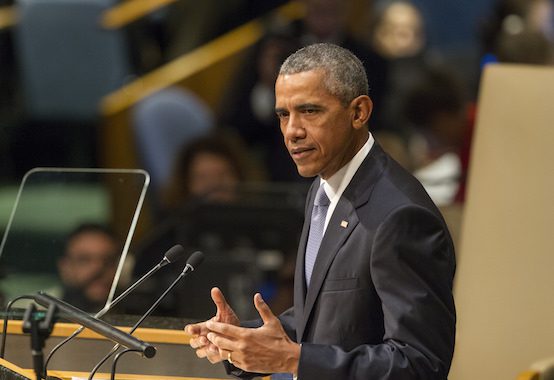Obama’s Foreign Policy Legacy

As we get closer to the start of Obama’s final year in office, the inevitable commentary on Obama’s “legacy” has already started. Fred Kaplan offered his assessment last week, arguing that Obama’s major accomplishments are much more fragile and reversible than the problems he will bequeath to his successor:
The problem with the president’s list of triumphs is that they’re provisional, while the failures are all too tangible and threatening. The potential for peace, prosperity, and global improvement, arising from his diplomatic achievements, is considerable, even transformative; but the results aren’t yet in—no one can foresee whether Iran will abide by the deal, Cuba will evolve toward democracy, the world’s nations will meet the warming targets, or the TPP will be ratified. By contrast, the Middle East is in flames, a million refugees are flooding into Europe, Americans are fearful, and the prospects for a swift, stable settlement in Syria—military, political, and humanitarian—seem dim.
Michael Rubin gives us a hostile assessment that doesn’t tell us very much about Obama’s policies, but conveys the reflexive contempt for anything Obama does that makes the reversal of some of his major diplomatic initiatives much more likely under a Republican administration. Whether Obama’s “provisional” successes endure will depend in large part on the outcome of the next election to a greater degree than is usually the case. If the Democrats retain the White House, it seems all but certain that the nuclear deal with Iran and normalization with Cuba will remain, and if the GOP takes over there is a good chance that both will be undone.
Kaplan gives Obama both too much and too little credit. He doesn’t include successes from Obama’s first term, and likewise doesn’t touch on Obama’s more serious errors from that period. Though it is all but forgotten now, the negotiation and ratification of New START were real successes early in Obama’s presidency. The new arms reduction treaty renewed and extended the provisions of the original START and continued the verification measures that have mutually benefited the U.S. and Russia for decades. The ratification of the treaty was all the more significant given the near-universal opposition to it from the GOP, and it would not have happened had it been brought to a vote any later than it was. While the treaty’s provisions were modest, they were nonetheless important and Obama deserves credit for getting the treaty ratified. On arms control and nonproliferation generally, Obama has done a reasonably good job. It is the rest of his foreign policy that doesn’t look all that impressive under scrutiny.
Any assessment of Obama’s foreign legacy has to include the intervention in Libya. Once touted as a “model” intervention and an example of the “responsibility to protect” in action, the Libyan war is now widely recognized to be a significant blunder that destabilized the region, provided an opening for jihadist gains, and contributed to the flow of refugees across the Mediterranean. Obama’s decision to intervene is that much harder to justify when one remembers how abruptly and arbitrarily Obama changed his position to favoring intervention at the last minute. Unlike the conflicts in Iraq and Afghanistan, the Libyan war is one wholly owned by Obama and his administration, and judged by almost any standard it has to be considered a serious failure. The Libyan war also confirmed that Obama would violate U.S. law without consequence (while pretending to be fastidious in respecting it) and reinforce the executive’s habit of ignoring Congress in matters of war. That has been further reinforced with the war on ISIS, which Obama continues to wage without legal authority after sixteen months. The war on Afghanistan that Obama escalated early in his first term will outlast the end of his second.
If Obama wanted his legacy to be that of a president who presided over the conclusion of foreign wars, he will instead be remembered as a president responsible for starting at least two wars, escalating a third, and abetting a fourth. Though Obama likes to claim that he does not favor perpetual war, no one has done more to normalize the constant, unauthorized use of force overseas than Obama has. The fact that he has done so while cultivating a reputation for using force “reluctantly” has only made things worse. Perversely, the one time that Obama considered using force and then decided against it–the so-called “red line” episode–has been turned into a justification for not consulting Congress about military action and another shoddy argument for backing up vague threats with bombing for the sake of “credibility.”
The war on Yemen that the U.S. has supported over the last nine months has to be the largest black mark on Obama’s record, and unlike some of the others this has been an entirely unforced error. Like the war itself, Obama’s support for the war on Yemen will probably be ignored in most accounts of Obama’s foreign policy legacy, but over time I suspect it will loom very large as the most shameful and indefensible episode in Obama’s presidency.
Comments